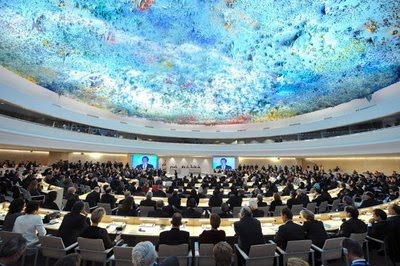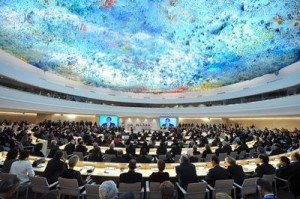On the 6th anniversary of the Syrian conflict, the Cairo Institute for Human Rights (CIHRS) affirmed its solidarity with the courageous Syrians who testified during the UN Human Rights Council’s 34th session about the grave human rights violations they endured. As it addressed the High Level Panel on Syria held on March 14, CIHRS warned UN member states that merely monitoring the conflict and expressing moral outrage is inadequate in safeguarding the lives of Syrian civilians. The conflict continues to devastate the lives and dignity of millions of people who are facing a war waged by the regime, for daring to demand their fundamental rights.
2016 has witnessed some of the darkest hours of bloodshed and atrocities of this conflict, in particular, during the heavy military campaign in Aleppo. The beginning of 2016 was marked by optimism after the UN Security Council unanimously adopted Resolution 2254 in December 2015 as a road map to peace. The peace process was then threatened by a heavy military campaign in Aleppo. Between July and December, the city was transformed from a site of a millennial civilization into rubble, with its eastern parts resembling a ghost city. According to the Independent Commission of Inquiry report discussed during this 34th HRC session – “egregious attacks” committed by all parties have resulted in war crimes and the use of chemical weapons by the regime against civilians during the attacks.
In response, CIHRS welcomes the UN Human Rights Council in giving voice to Syrian victims during the High Panel to express their long years of suffering. In this regard, CIHRS supports the UN General Assembly’s resolution on 21 December 2016 to create an investigative mechanism as a step in the right direction towards ending the overarching sense of impunity that all the warring parties in Syria are enjoying, including foreign armies and fighters. CIHRS deplores the UN Security Council’s continuous failure to take adequate measures to end breaches to international order. This failure was most recently exemplified by the Russian- Chinese veto on sanctions in response to the regime’s use of chemical weapons on civilians. The UN must review its practices with regards to the use of veto powers when international crimes have been committed.
All states have an obligation to prevent further deterioration of the dire humanitarian situation in Syria. This is achieved through states fulfilling their obligations through the Common Article 1 of all four Geneva Conventions, which entails investigating and prosecuting acts of crime committed in Syria through states’ domestic judicial systems.
All states should also seek means to cooperate to put an end to the conflict, including by creating information-sharing mechanisms to ensure that perpetrators of crimes in Syria don’t escape justice. Furthermore, each individual state should ensure it does not aid or assist the commission of war crimes by limiting arm sales to warring parties in this conflict.
In this regard, we call on the Council to mandate a study to identify good practices and deliver detailed, practical recommendations on the steps governments can take to strengthen and improve the use of national and universal jurisdiction in relation to crimes committed in Syria.
Share this Post


